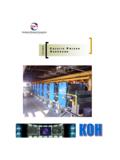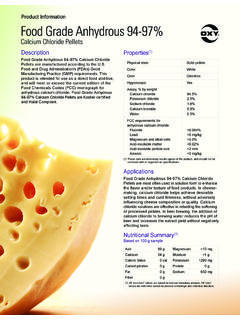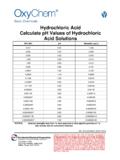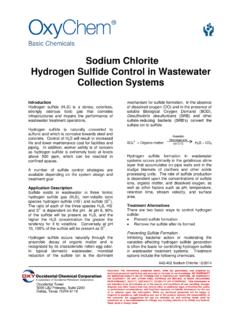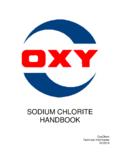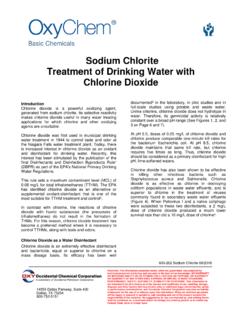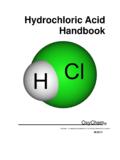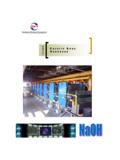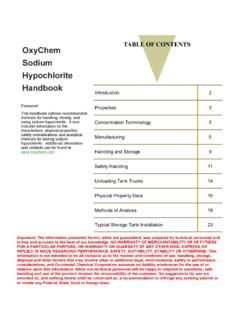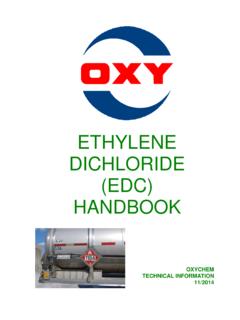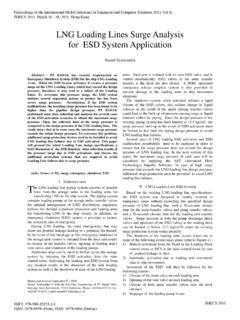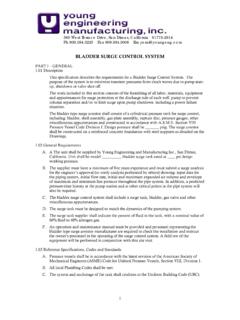Transcription of Hydrochloric Acid Venting Hydrochloric Acid Tanks
1 Basic Chemicals 100-102 Hydrochloric acid 01/2015 Occidental Tower 5005 LBJ Freeway, Suite 2200 Dallas, Texas 75244-6119 Important: The information presented herein, while not guaranteed, was prepared by technical personnel and is true and accurate to the best of our knowledge. NO WARRANTY OF MERCHANTABILITY OR OF FITNESS FOR A PARTICULAR PURPOSE, OR WARRANTY OR GUARANTY OF ANY OTHER KIND, EXPRESS OR IMPLIED, IS MADE REGARDING PERFORMANCE, SAFETY, SUITABILITY, STABILITY OR OTHERWISE. This information is not intended to be all-inclusive as to the manner and conditions of use, handling, storage, disposal and other factors that may involve other or additional legal, environmental, safety or performance considerations, and OxyChem assumes no liability whatsoever for the use of or reliance upon this information. While our technical personnel will be happy to respond to questions, safe handling and use of the product remains the responsibility of the customer.
2 No suggestions for use are intended as, and nothing herein shall be construed as, a recommendation to infringe any existing patents or to violate any Federal, State, local or foreign laws. Hydrochloric acid Venting Hydrochloric acid Tanks All Hydrochloric acid storage Tanks must be properly vented to avoid exceeding the pressure or vacuum rating of the tank. Exceeding the design limits of the tank could lead to possible failure of the tank. A pressure/vacuum relief device should be in place in addition to the tank vent. Internal Tank Pressure/Vacuum The most significant increase in pressure occurs when filling the tank. As acid is transferred into the tank, the pressure tends to increase unless the vent system has the capability to relieve the pressure. When liquid is withdrawn from the tank, an equal volume of outside air must enter the tank through a vent system or a partial vacuum will be created inside the tank which could result in cracking or collapse of the tank.
3 When acid is unloaded by air pressure from a tank car or trailer, a properly designed vent is extremely important because of the sudden surge of air through the hose at the end of the unloading. The vent system must be designed to handle this air surge condition. In order to provide guidance on storage tank vent requirements, a calculated air flow rate could be 1350 SCFM at the completion of a typical unloading operation. This calculation was based upon a 2 unloading hose 25 feet long; maximum pressure in the tank car or trailer of 30 PSIG; unloading into a storage tank 8 feet high; and with a vertical tank vent line not exceeding 3 feet in length. Vent Systems A properly designed vent system will keep the tank at or near atmospheric pressure and within the tank design parameters. It is recommended that acid Tanks vent into fume scrubber systems to absorb all acid vapors.
4 There are 2 basic Venting systems used most commonly: (1) vent through a fume scrubber open to the atmosphere; and (2) completely closed system not open to the atmosphere. Both the fume scrubber and closed systems eliminate acid vapor emission to the atmosphere. The closed system must use a pump only for unloading and transferring acid and utilizes return vapor lines, , from the storage tank to the tank trailer or tank car while unloading. This system would normally contain a pressure/vacuum relief device also connected to a scrubber in case of pressure release. Vent Design Vent designs must be based upon a specific system, starting with the pressure/vacuum rating for the tank and incorporating maximum anticipated vent requirements which are dependent upon; liquid flow rates; Basic Chemicals 100-102 Hydrochloric acid 01/2015 Occidental Tower 5005 LBJ Freeway, Suite 2200 Dallas, Texas 75244-6119 Important: The information presented herein, while not guaranteed, was prepared by technical personnel and is true and accurate to the best of our knowledge.
5 NO WARRANTY OF MERCHANTABILITY OR OF FITNESS FOR A PARTICULAR PURPOSE, OR WARRANTY OR GUARANTY OF ANY OTHER KIND, EXPRESS OR IMPLIED, IS MADE REGARDING PERFORMANCE, SAFETY, SUITABILITY, STABILITY OR OTHERWISE. This information is not intended to be all-inclusive as to the manner and conditions of use, handling, storage, disposal and other factors that may involve other or additional legal, environmental, safety or performance considerations, and OxyChem assumes no liability whatsoever for the use of or reliance upon this information. While our technical personnel will be happy to respond to questions, safe handling and use of the product remains the responsibility of the customer. No suggestions for use are intended as, and nothing herein shall be construed as, a recommendation to infringe any existing patents or to violate any Federal, State, local or foreign laws.
6 Maximum air flow rates for air unloading; transfer line size, length and configuration; and tank pressure/vacuum rating. These parameters are very critical in sizing vent lines. As an example, using the parameters of the previous air surge calculation, the following tank design pressures require certain vent line sizing: a) A tank designed for +25 Water Column requires a 3 diameter vent b) A tank designed for +10 Water Column requires a 4 diameter vent c) A tank designed for +1 Water Column requires a 5 diameter vent The use of a larger diameter unloading line, longer vent line or vent line tied into a scrubber, etc. will require an even larger size vent line. When a vent line ties into a scrubber system or other vapor control device, an additional pressure/vacuum relief device with appropriate settings should be installed on the storage tank.
7 Scrubber Systems A fume scrubber is recommended for an acid storage tank system. A properly designed fume scrubber will eliminate the release of irritating and corrosive vapors of Hydrochloric acid into the workplace and atmosphere. The type of scrubber which an individual facility should select will depend upon a number of factors including: method of offloading from tank car or tank truck (air pressure or pump), the ability to reuse dilute acid solutions which may be generated from the scrubbing operation, and permitting requirements needed in order to discharge or dispose of acidic solutions or other solutions generated as a result of the scrubbing operation. The recirculating scrubber and the packed column scrubber are the two scrubbing systems used most commonly. The Recirculating Scrubber consists of a pump, lines, eductor, scrubber tank, and sparger.
8 In this system, the fume eductor draws acid vapors from the storage tank. The acid vapors are then absorbed by water being recirculated through the eductor. The solution in the scrubber tank gradually builds strength up to a maximum of 15% HCl. At this point, the weak acid solution should be removed for use or sent to an appropriate hazardous waste treatment site. The scrubber tank is then recharged with fresh water. No acid is lost and the fumes from the Hydrochloric acid are contained by the system. In the Packed Column Scrubber water is fed into the top of a packed column and acid vapors from the storage tank are fed into the bottom. The acid vapors are removed from the air by scrubbing them with the countercurrent flow of water. The air then vents out of the top of the scrubber and the weak acid flows into a suitable chemical waste handling system.
9 Further Information contact: OxyChem Technical Service Department PO Box 12283 Wichita, Kansas 67277-2283 800-733-1165 Ext. 1
